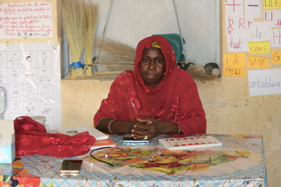Teacher Stories: Fannami - Diffa, Niger
This story was collected as part of Teachers in Crisis Contexts (TiCC) Event Series to ensure that the voices and experiences of teachers working in crisis and displacement permeate all aspects of the event. For more stories, click here.
Supporting the Education and Social Emotional Development of Children
Name: Fannami
Role: Principal
School: Festival Traditional Primary School
Location: Diffa, Niger
Life can be especially challenging for children living in Niger. For decades, the country has grappled with the scourges of deeply entrenched poverty, drought, cholera epidemics and political violence. Niger consistently ranks near the bottom of the United Nations Human Development Index and the country’s instability has only intensified since 2013, when the Boko Haram insurgency began displacing hundreds of thousands of people in the region. An estimated 137,000 children are out of school in the Diffa region of Niger alone.
In the face of this adversity, the 480 students who attend Festival Traditional Primary School in the Diffa region of Niger have the opportunity to thrive as they benefit from the wisdom and leadership of their school’s principal, a woman named Fannami Ambalam. The work and leadership Ambalam has demonstrated holds the potential to both enhance daily life for her students in the present and help prepare them for stable, independent lives as adults.
Ambalam has led the Festival Traditional Primary School since 2014. In that capacity she is not only responsible for providing a stable and nurturing space for the hundreds of students in her care; she must also oversee and support the professional development of the teachers serving those students. Working with the International Rescue Committee (IRC) through a project funded by Dubai Cares, she has been able to provide this support despite the challenging circumstances and a profound lack of resources.
An integral component of that support has been a tutoring program that strengthens the quality of instruction in literacy, numeracy and social-emotional learning for the students and educators in her school. Additionally, Ambalam’s school has benefitted from refurbishment, equipment and teaching and learning resources. Furthermore, the Festival Traditional’s Mothers’ Association members were given valuable training and resources to conduct small income -generating activities that support the maintenance of the school.
The views expressed in this blog are the author's own.
“We usually hardly manage the school with the resources available,” Ambalam said. “Teachers sometimes buy the manuals with their own resources, but now with the support of IRC/Dubai Cares, we have necessary manuals accessible.”
In recent years, Ambalam has introduced her teachers and students to the concept of social-emotional learning (SEL). SEL has been shown to benefit students in a wide variety of contexts but is particularly important in crisis contexts like Niger, where most if not all of the students have experienced severe and prolonged adversity. At Festival Traditional Primary School, two standout SEL practices have included Brain Games and mindfulness lessons. Assessments of the effectiveness of this programming have shown they contributed to significant gains by the students and teachers participating, including improved literacy and numeracy outcomes. To Ambalam, the results and the merit of this SEL programming speaks for itself.
“I am so grateful, you know why?” Ambalam said. “Because we see the impact of the training on Brain Games and mindfulness in our way with students focusing on the task.”
While she stands out as a community leader, Ambalam and her school are not alone. Festival Traditional Primary School is one of 30 schools in the Diffa region of Niger where the IRC has supported after-school tutoring based on IRC’s Healing Classrooms model for children including Nigerian refugees and Nigerien displaced children who are underperforming. The Healing Classrooms approach is a key part of IRC’s support for children in crisis contexts across the globe. It draws on 30 years of experience in education in emergency programming and more than a decade of research and field testing to provide conflict-affected children a safe, stable and predictable space to heal, grow and learn and thrive.



